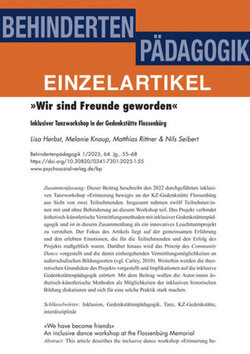14 Seiten, PDF-E-Book
Erschienen: März 2025
Bestell-Nr.: 23617
https://doi.org/10.30820/0341-7301-2025-1-55
abonnieren
Lisa Herbst, Melanie Knaup, Matthias Rittner & Nils Seibert
»Wir sind Freunde geworden« (PDF)
Inklusiver Tanzworkshop in der Gedenkstätte Flossenbürg
Sofortdownload
Dies ist ein E-Book. Unsere E-Books sind mit einem personalisierten Wasserzeichen versehen,
jedoch frei von weiteren technischen Schutzmaßnahmen (»DRM«).
Erfahren Sie hier mehr zu den Datei-Formaten.
Dieser Beitrag beschreibt den 2022 durchgeführten inklusiven Tanzworkshop »Erinnerung bewegt« an der KZ-Gedenkstätte Flossenbürg aus Sicht von zwei Teilnehmenden. Insgesamt nahmen zwölf Teilnehmer:innen mit und ohne Behinderung an diesem Workshop teil. Das Projekt verbindet ästhetisch-künstlerische Vermittlungsmethoden mit inklusiver Gedenkstättenpädagogik und ist in diesem Zusammenhang als ein innovatives Leuchtturmprojekt zu verstehen. Der Fokus des Artikels liegt auf der gemeinsamen Erfahrung und den erlebten Emotionen, die für die Teilnehmenden und den Erfolg des Projekts maßgeblich waren. Darüber hinaus wird das Prinzip des Community Dance vorgestellt und die damit einhergehenden Vermittlungsmöglichkeiten an außerschulischen Bildungsorten (vgl. Carley, 2010). Weiterhin werden die theoretischen Grundsätze des Projekts vorgestellt und Implikationen auf die inklusive Gedenkstättenpädagogik erörtert. Mit dem Beitrag wollen die Autor:innen ästhetisch-künstlerische Methoden als Möglichkeiten der inklusiven historischen Bildung diskutieren und sich für eine solche Praktik stark machen.
Abstract:
This article describes the inclusive dance workshop »Erinnerung bewegt« held at the Flossenbürg Concentration Camp Memorial in 2022 from the perspective of two participants. A total of twelve participants with and without disabilities took part in this workshop. The project combines aesthetic-artistic mediation methods with inclusive memorial site education and can be seen as an innovative flagship project in this context. The focus of the article is on the shared experience and the emotions experienced, which were decisive for the participants and the success of the project. In addition, the principle of community dance is presented and the associated mediation possibilities in extracurricular educational centres (vgl. Carley, 2010). Furthermore, the theoretical principles of the project are presented and implications for inclusive memorial pedagogy are discussed. With this article, the authors want to discuss aesthetic-artistic methods as possibilities for inclusive historical education and advocate for such a practice.
Abstract:
This article describes the inclusive dance workshop »Erinnerung bewegt« held at the Flossenbürg Concentration Camp Memorial in 2022 from the perspective of two participants. A total of twelve participants with and without disabilities took part in this workshop. The project combines aesthetic-artistic mediation methods with inclusive memorial site education and can be seen as an innovative flagship project in this context. The focus of the article is on the shared experience and the emotions experienced, which were decisive for the participants and the success of the project. In addition, the principle of community dance is presented and the associated mediation possibilities in extracurricular educational centres (vgl. Carley, 2010). Furthermore, the theoretical principles of the project are presented and implications for inclusive memorial pedagogy are discussed. With this article, the authors want to discuss aesthetic-artistic methods as possibilities for inclusive historical education and advocate for such a practice.
Erik WeberS. 3–4Editorial (PDF)
Merlin WaglerS. 5–29Handlungsfähigkeit und Widerstand des behinderten Subjekts (PDF)
Bearbeitung von Leerstellen der Butler’schen Theorie der SubjektivierungSven HeuerS. 30–54Die Handlungslogik pädagogischer Zwangsinterventionen (PDF)
Professionsund legitimationstheoretische Anmerkungen zum PaternalismusproblemLisa Herbst, Melanie Knaup, Matthias Rittner & Nils Seibert S. 55–68»Wir sind Freunde geworden« (PDF)
Inklusiver Tanzworkshop in der Gedenkstätte FlossenbürgBernhard SchmalenbachS. 69–71Rezension von: Jens-Jürgen Clausen (2023). Studienbuch Heilpädagogik (PDF)
Monika Glück-ArndtS. 72Behindertenpädagogik in Hessen (PDF)
Schwerpunktthema: MuseumspädagogikMelanie KnaupS. 73–87Museumspädagogik inklusiv (PDF)
Die Rolle der Museen in einer inklusiven GesellschaftKarl Ludwig RabeS. 88–96Aus der Verbandsarbeit (PDF)
Erik WeberS. 97–99Jahresinhaltsverzeichnis 2024 (PDF)
Merlin WaglerS. 5–29Handlungsfähigkeit und Widerstand des behinderten Subjekts (PDF)
Bearbeitung von Leerstellen der Butler’schen Theorie der SubjektivierungSven HeuerS. 30–54Die Handlungslogik pädagogischer Zwangsinterventionen (PDF)
Professionsund legitimationstheoretische Anmerkungen zum PaternalismusproblemLisa Herbst, Melanie Knaup, Matthias Rittner & Nils Seibert S. 55–68»Wir sind Freunde geworden« (PDF)
Inklusiver Tanzworkshop in der Gedenkstätte FlossenbürgBernhard SchmalenbachS. 69–71Rezension von: Jens-Jürgen Clausen (2023). Studienbuch Heilpädagogik (PDF)
Monika Glück-ArndtS. 72Behindertenpädagogik in Hessen (PDF)
Schwerpunktthema: MuseumspädagogikMelanie KnaupS. 73–87Museumspädagogik inklusiv (PDF)
Die Rolle der Museen in einer inklusiven GesellschaftKarl Ludwig RabeS. 88–96Aus der Verbandsarbeit (PDF)
Erik WeberS. 97–99Jahresinhaltsverzeichnis 2024 (PDF)

